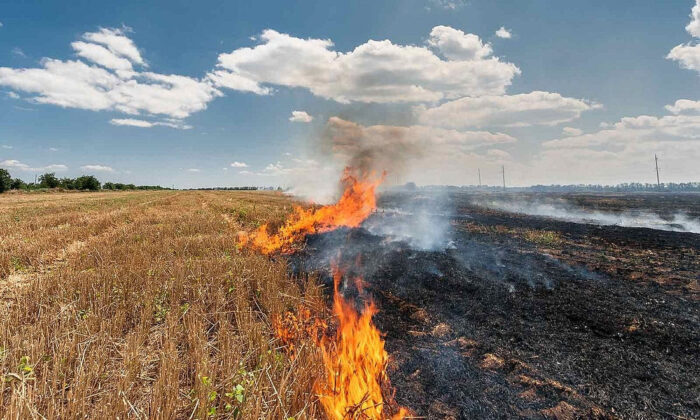 The Supreme Court just noticed the smoke from paddy stubble fires because it reaches the doors and windows of Delhi and perhaps even its own chambers. But what about the slower, deadlier damage that paddy has inflicted on Punjab’s soil and water? Year after year, deep tube-wells pump out arsenic-laced groundwater, depleting the water table and spreading cancer across Punjab’s countryside. Nearly two-thirds of wells monitored in the state show a drop in water levels, with declines in some districts like Barnala as deep as 20 metres in a decade. Punjab and Haryana together have already lost 64.6 billion cubic metres of groundwater between 2003 and 2020. In many villages, the only water left is toxic — arsenic levels exceed safe limits in 13 districts, and in Gurdaspur, 80% of samples were found unsafe. This is not just an environmental crisis; it is a slow poisoning of an entire generation. Why has the Court not noticed that? Punjab is not the criminal here; it is the victim of decades of flawed government policies that incentivised paddy monoculture to feed the nation. Yes, paddy stubble should not be burnt — on that we all agree. But before threatening jail for farmers, let the Court first examine the other side: the absence of a viable economic policy for stubble management. That is not the farmers’ failure; it is the Government’s responsibility.
The Supreme Court just noticed the smoke from paddy stubble fires because it reaches the doors and windows of Delhi and perhaps even its own chambers. But what about the slower, deadlier damage that paddy has inflicted on Punjab’s soil and water? Year after year, deep tube-wells pump out arsenic-laced groundwater, depleting the water table and spreading cancer across Punjab’s countryside. Nearly two-thirds of wells monitored in the state show a drop in water levels, with declines in some districts like Barnala as deep as 20 metres in a decade. Punjab and Haryana together have already lost 64.6 billion cubic metres of groundwater between 2003 and 2020. In many villages, the only water left is toxic — arsenic levels exceed safe limits in 13 districts, and in Gurdaspur, 80% of samples were found unsafe. This is not just an environmental crisis; it is a slow poisoning of an entire generation. Why has the Court not noticed that? Punjab is not the criminal here; it is the victim of decades of flawed government policies that incentivised paddy monoculture to feed the nation. Yes, paddy stubble should not be burnt — on that we all agree. But before threatening jail for farmers, let the Court first examine the other side: the absence of a viable economic policy for stubble management. That is not the farmers’ failure; it is the Government’s responsibility.
Let us be blunt: farmers burn residue because it is the cheapest, fastest way to clear fields between paddy harvest and wheat sowing. Stubble management is neither trivial nor free. It requires machines, labour, storage, transport and time in an already tight window. None of that is factored into the MSP that the state promises. MSP calculations include seed, fertiliser and labour — not the heavy cost of residue handling. Expecting a small-holder to shoulder that bill while state policy continues to reward water-guzzling paddy is neither fair nor effective. It is scapegoating.

Is former Member of Punjab Public Service Commission
A farmer and keen observer of current affairs
If we are serious about stopping farm fires, we must start by changing the economics. Arrests may make headlines; only a sustained policy framework will change behaviour. And that policy framework must begin with the recognition that Punjab is paying the price of being forced into paddy production for national food security — a role that has left it with poisoned water, desertifying soils and a broken agrarian economy.
1) Make stubble management a declared, funded cost — over and above MSP.
Announce a residue-management top-up that is paid to farmers (or to village custom-hiring centres) per hectare at the time of procurement. This needs to be explicit and visible — not a vague “incentive” that disappears in budget footnotes. A guaranteed, time-bound payment will enable farmers to pay for happy-seeders, mulchers, or collection and transport of straw for industry. Only after such alternatives are demonstrably affordable and available should punitive provisions be invoked.
2) Create a market — and mandate industrial offtake — for paddy residue.
Stubble is not waste; it is biomass. It can be converted to bio-gas, briquettes for boilers, feedstock for thermal plants, and fuel for brick kilns. Where fly-ash was once a disposal problem and then converted into an industrial input by regulation, paddy straw can follow the same path. Make it mandatory for large boilers, thermal plants and brick kilns in consuming states to purchase a fixed percentage of biomass briquettes. If Punjab has to bear the cost of producing rice for India, then India’s industries must bear the responsibility of consuming its stubble.
3) Build the infrastructure: bio-gas and decentralised processing.
A centralised bio-gas or briquetting unit in every cluster of paddy-producing villages should not be an afterthought. Support the rapid rollout of medium-scale plants through viability-gap funding, concessional loans and public–private partnerships. Where local bio-gas plants were stalled by vested objections, the state must show political will: fast-track clearances, protect investors from harassment and make access to land and grid connections easier.
4) Introduce a hypothecated “paddy environmental compensation” (a paddy tax on consumers).
Just as society accepts carbon pricing and green taxes to internalise environmental costs, consumers of rice and related industrial users can be charged a small, transparent levy. This “paddy tax” would be hypothecated — ring-fenced — to fund residue management, biomass infrastructure and groundwater recharge programs in producing states. The message is simple: Punjab should not be left alone to pay for the ecological disaster created by national food policies. Those who consume the rice must also share the environmental cost.
5) Tackle the root: move away from water-guzzling paddy.
Saying “we will reduce paddy” has become a ritual. But rhetoric is cheap; policy is costly. Replace perverse incentives that lock Punjab and Haryana into rice monoculture — free electricity, procurement guarantees and skewed MSP structures. Offer a credible, time-bound package for crop diversification: procurement assurances, better MSPs for alternative crops, targeted credit, assured market linkages, insurance support and an aggressive extension service to promote less thirsty varieties and cropping systems. Without a credible safety net, farmers will stick with paddy because feeding 1.2 billion people is a politically powerful argument — and because switching crops is risky.
6) Revisit irrigation and power pricing.
Unlimited, untimed free electricity for tube-wells has been a core driver of groundwater depletion and the expansion of paddy into ecologically fragile zones. Introduce measured, tiered pricing or scheduled electricity supply for irrigation coupled with strong measures for metering and incentivising solar pumping and micro-irrigation. Link any liberalisation to direct transfers that compensate the truly small and marginal farmers so the poor are not punished.
7) Enforcement that is fair: incentivise first, penalise later.
A blanket jail threat without alternatives is unjust. Make burning a punishable offence only after a clear, state-financed alternative has been made available and the paddy tax/industrial offtake mechanism is operational. Penalties should be proportional and targeted: larger fines and action against industrial buyers and middlemen who profit from the current status quo; support and alternatives for smallholders.
Punjab did not create this crisis alone; it was created by the state’s compulsion to grow paddy for the rest of India. It now suffers doubly — poisoned water, depleting aquifers, rising cancer rates, and blame for smoke in Delhi. To treat Punjab as a criminal in this disaster is unjust. The real accountability lies with government policies that promoted paddy monoculture without planning for its consequences.
Ending stubble burning is not a law-and-order problem; it is an economic design problem. If we truly want clean air and sustainable farming, then let the Supreme Court, governments and policymakers first look at the economic architecture. Arrests will make noise; changing the economics will make change. Punjab deserves not punishment but policy justice.
The solution lies not in the fields, but in the Parliaments and the Vidhan Sabhas